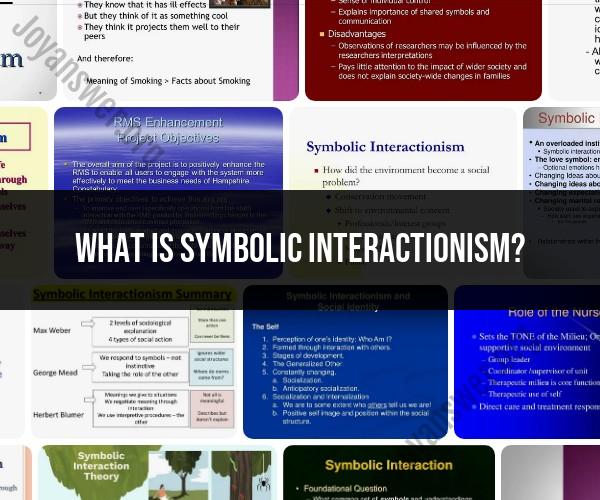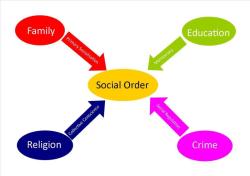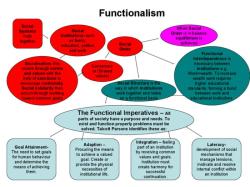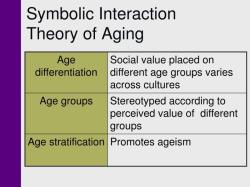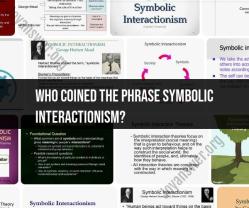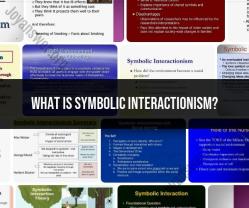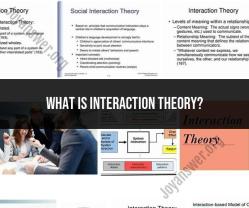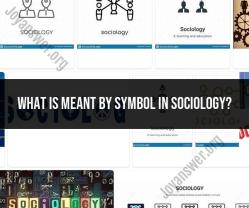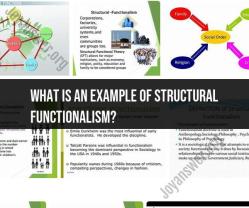What is symbolic interactionism?
Symbolic Interactionism is a sociological perspective that focuses on the micro-level interactions and symbols in everyday life. It is a theory that emphasizes the importance of symbols, meanings, and social interactions in shaping individuals' experiences and understanding of the social world. Symbolic Interactionism was developed by George Herbert Mead, Charles Horton Cooley, and other scholars in the early 20th century and has since become a prominent and influential perspective within sociology.
Key concepts and principles of Symbolic Interactionism include:
Symbols:
- Definition: Symbols are anything that carries a particular meaning that is recognized by people who share a culture.
- Role: Symbolic interactionists emphasize the use of symbols in communication and the process by which individuals interpret and attach meanings to these symbols.
Meaning:
- Subjective Interpretation: Symbolic Interactionism focuses on the subjective interpretation of symbols. Meaning is not inherent in objects or symbols but is created through social interaction.
- Shared Meanings: People engage in a constant process of creating and modifying meanings in social interactions, and these meanings are often shared within a community or society.
Social Interaction:
- Face-to-Face Interaction: Symbolic Interactionism is concerned with the micro-level interactions that occur in face-to-face settings. It explores how individuals engage with each other in social encounters.
- Reciprocity: Social interactions involve a reciprocal process where individuals respond to and interpret the actions of others.
Self and Identity:
- Looking-Glass Self: Symbolic interactionists draw on the concept of the "looking-glass self," developed by Charles Horton Cooley. This theory suggests that individuals develop a sense of self through imagining how others perceive them.
- I and Me: George Herbert Mead introduced the idea of the "I" (the spontaneous, creative self) and the "Me" (the socialized self, influenced by others' expectations). The self is seen as an ongoing process that emerges in social interactions.
Role-Taking:
- Role-Taking Process: Symbolic Interactionism emphasizes the role-taking process, where individuals put themselves in others' shoes to understand their perspectives.
- Significant Others: Individuals consider the perspectives of significant others (those with whom they have close relationships) when shaping their own behaviors and identities.
Social Construction of Reality:
- Reality as a Social Construct: Symbolic Interactionism argues that reality is socially constructed through human interaction. People collectively create and maintain shared meanings, which constitute their understanding of reality.
- Meaningful Reality: The world is not perceived as an objective reality but as a meaningful reality shaped by the meanings individuals assign to objects, events, and symbols.
Dramaturgical Model:
- Goffman's Dramaturgy: Erving Goffman, influenced by symbolic interactionism, introduced the dramaturgical model. It views social life as a theatrical performance where individuals play roles, manage impressions, and adhere to social scripts.
Symbolic Interactionism provides a valuable perspective for understanding the micro-level dynamics of human interaction, the formation of identity, and the ways in which shared meanings are created and negotiated in everyday life. It has been applied to various fields, including sociology, psychology, communication studies, and education.
What is the concept of symbolic interactionism?
Symbolic interactionism is a sociological theory that focuses on the way individuals create and interpret meaning through social interaction. It emphasizes that meaning is not inherent in objects or events, but rather arises from the shared understanding and interpretation of individuals within a specific social context. Here are some key concepts:
1. Meaning is socially constructed: Symbolic interactionists believe that meaning is not fixed or predetermined, but rather arises from the interactions and interpretations of individuals within a social context. These interactions involve the exchange of symbols, such as words, gestures, and actions, which individuals use to understand and communicate their meaning.
2. Individuals are active agents: People are not simply passive recipients of meaning, but rather active agents who participate in the construction and negotiation of meaning. They interpret symbols, assign meaning to situations, and act based on their understanding of the world.
3. The self is a social product: Symbolic interactionists argue that the self is not a fixed entity, but rather a product of social interaction. Our self-concept is shaped by the way others perceive and interact with us, and we continuously adjust our self-presentation based on the feedback we receive from others.
4. Micro-interactions are important: While large-scale social structures and institutions influence our lives, symbolic interactionists focus on the importance of micro-interactions in shaping our understanding of the world. These everyday interactions, such as conversations with friends or encounters with strangers, play a crucial role in constructing and negotiating meaning.
5. The importance of symbols: Symbolic interactionists highlight the role of symbols in communication and meaning-making. Symbols, such as words, gestures, and objects, are used to convey meaning and understanding between individuals. The interpretation of these symbols can vary depending on the social context and individual experiences.
Key figures associated with symbolic interactionism include:
- George Herbert Mead
- Charles Cooley
- Erving Goffman
- Howard Becker
- Anselm Strauss
Applications of symbolic interactionism:
- Understanding social behavior and interaction
- Analyzing social movements and collective action
- Studying identity and self-concept
- Examining the role of media and communication in society
- Exploring the dynamics of power and inequality
Overall, symbolic interactionism offers a valuable perspective for understanding human behavior and the construction of meaning in society. Its focus on social interaction, individual agency, and the interpretation of symbols provides a powerful tool for analyzing various social phenomena.
